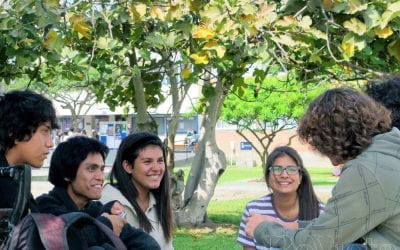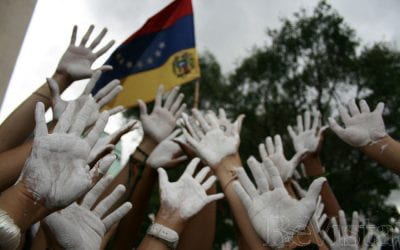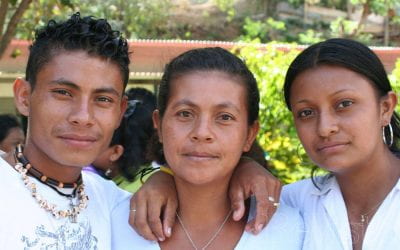Venezuela’s Student Movement
“Either We Fight for Education or We Lose It.”

Venezuelan students face down heavily armed military in a demonstration. Photo courtesy of Erick Rozo.
Students in Venezuela have an 84 percent confidence rating in polls among the public, higher even than the Church or banks, according to www.datanalisis.com. Our struggle for democracy sometimes feels like the struggle of David against Goliath. However, we insist on following democratic paths with a determined spirit that we hope will be contagious.. As students, we try to make our voices heard as protagonists, rather than spectators. Our current goal is to spearhead voter registration even in the most remote areas of Venezuela. Organization is extremely necessary if we are to succeed in reestablishing democracy. In the last few years, we students have mobilized to change the country, at the same time as we seek to maintain the right to free expression.
In Venezuela, bad public administration has led to deplorable conditions in the country’s public schools. Thus, from an early age, young people have learned to fight for the right to have a good-quality education. Our struggle has been hard, but our hopes are still as high as on the first day that we began to protest for the right to free expression, to think and dream differently.
As I think of my own experience, memories of my schooldays bring a smile to my face. I attended school in a poor area of Caracas, one of those neighborhoods where residents live with hope but also with the fear of not knowing if they will get home safely. During my elementary and high school years, I learned about the great protagonists of Venezuelan history, especially the role of youth and students in the construction of its democracy: the Generation of ’28, irreverent youth who took a firm stance against anti-democratic forces and dictatorship, followed by the “Generation of 1958,” youth who courageously led in overturning a dictatorship and became active in our political life for the next fifty years.
It was encouraging to learn that other generations of young students all over the world had also engaged in struggles for social justice. So by the time I got to the Central University of Venezuela (UCV) in 2007, I was steeped in such history and worldview. However, we Venezuelans are constantly told that we need to study a field that will lead to economic success rather than follow our passions and study for the sake of intellectual fulfillment. I was no exception. My parents urged me to get my undergraduate degree in computer studies.
At about the time I started my university studies, a series of events resulted in a crackdown on freedom of expression in Venezuela. The country’s most established television station, Radio Caracas Televisión (RCTV), was shut down. The government of President Hugo Chávez engaged in a series of arbitrary actions against the press. These attacks sent the student movement into the streets. As a student at UCV—Venezuela’s main university—it was impossible for me not to join the mobilizations, many of them protests in favor of freedom of expression. Despite the protests, the national government enacted budgetary measures that asphyxiated Venezuelan higher education, a blow that motivated students to organize nationwide to join forces against an increasingly authoritarian government. We then took up the banner of struggle against a constitutional reform that the government sought to impose through a plebiscite. And with joy I confirm that we won! It was one of the most important elections ever held in Venezuela, and the government of Hugo Chávez lost. And not only that: he didn’t lose the election to some political party or other. He lost it to the students, who overcame fear and took to the streets to fight for our rights today and to dream of a future different from what the present government offered and continues to offer us.
I became thoroughly engaged in politics, involved in student efforts to pay back to Venezuela what it had given us through free education. I decided to change my major from computer studies to international politics. We began to develop a student movement that grew from year to year and now numbers two distinct generations of student protesters against government abuses.
Students and workers joined together in hunger strikes for better salaries and for fair student loans; we staged several marches against budget cuts and demonstrated for union rights. Engaging in political activism provided the backdrop to my studies as a future professional in international relations, or it may even lead to a political career. Indeed, many young people today—including myself—are asking questions about our future involvement in politics. Our activism contrasts with the relative disinterest of recent generations.
The formation of the student movement was a team decision, a decision of classmates interested in the struggles for rights by and for students within our university. It was a grassroots movement, a local activism that began to extend outward, replicating local activities on the national scene.
In November 2011, we decided to turn our Federation of University Centers into the chief student representative body, bringing together students centers according to their fields of study. This grouping of students and the subsequent formation of local leadership teams have strengthened and legitimized our struggle, which has extended even to students not involved in the federation. We managed to hold elections even though government repression had prevented many such student elections, as well as elections for rectors; thus we sought to confer legitimacy on our compañeros in other universities by providing them with an umbrella organization.
This new generation to which I belong is organizing a nationwide civic project that involves professors, students, office workers and laborers. All of us have gathered together for a common cause: the university and the universality of free thought. Our sort of movement has already brought about changes in several countries. These are not individual or partisan movements: they bring about an authentic union of hundreds and thousands of youth who have been struggling through non-violent actions on the streets to assert our rights in the face of an authoritarian regime that has monopolized public power and done away with political independence.
Until recently, the National Electoral Council (CNE) hindered the registration of new voters (mostly young students). We took action by chaining ourselves to CNE headquarters demanding that voter registration centers be set up on campus. Soldiers beat us up, sent out to silence us and to repress our peaceful protest. Such violence against peaceful protesters made me understand Gandhi’s saying, “They will have to beat us as they beat water—until their arms get tired.”
We are not giving up. We work to find a strategy to effectively register young voters to support the electoral campaign in its democratic spaces; we continue to criticize; and above all, we continue to unite all our efforts during this new critical stage. This is a time when students—and, above all, young students—are called upon to defend the university. Unlike other generations, we have had to live 14 years under “socialism,” which has ended up eroding our democratic institutions. Our commitment is to defend education and its vision of free expression as the principal weapon to confront authoritarian governments.
Fall 2012, Volume XII, Number 1
Erick Rozo is a student of international relations at the Central University of Venezuela (UCV). He is a student leader and the political coordinator of the Federation of University Centers (FCU-UCV). He is an activist in favor of social rights. Rozo is a national leader of the Student Movement 2012 and the national youth coordinator of the political party Popular Will (Voluntad Popular). He is a member of the Latin American Network for Democracy. He can be reached on Twitter: @erick_rozo.
Related Articles
University Lessons: Editor’s Letter
I learned about universities on the barricades. Well, not exactly. I was a philosophy student at Barnard—the women’s college at Columbia University—when the uprising began in 1968. Students, including my boyfriend and several classmates, took over buildings to protest…
The Last Word
More than twice as many Latin Americans are attending institutions of higher education than two decades ago, and the number will continue to increase as more students graduate from secondary schools. ReVista’s timely focus on higher education is thought-provoking…
Making a Difference: A Problem With the UN Millennium Goals
Every Saturday for two years, Estevana Sánchez walked through the jungle for miles, in the dark, crossing a river in the rainy season, to finish high school. Her five teenage children did the same. At the end of the trail, they took a long bus ride to the town of San Juan del Sur…




